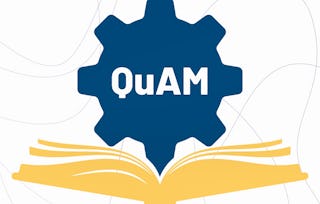This course provides a foundational understanding of machine learning models (logistic regression, multilayer perceptrons, convolutional neural networks, natural language processing, etc.) and demonstrates how they can solve complex problems in various industries, from medical diagnostics to image recognition to text prediction. Through hands-on practice exercises, you'll implement these data science models on datasets, gaining proficiency in machine learning algorithms with PyTorch, used by leading tech companies like Google and NVIDIA.

Introduction to Machine Learning

Introduction to Machine Learning



Instructors: Lawrence Carin
Access provided by Abu Dhabi National Oil Company
238,750 already enrolled
3,805 reviews
What you'll learn
Explain various machine learning models and how they can solve complex problems in multiple industries from medical diagnostics to text prediction.
Implement data science models on datasets through hands-on practice exercises.
Skills you'll gain
- Machine Learning
- Artificial Neural Networks
- Transfer Learning
- Python Programming
- Deep Learning
- PyTorch (Machine Learning Library)
- Reinforcement Learning
- Computer Vision
- Unsupervised Learning
- Recurrent Neural Networks (RNNs)
- Logistic Regression
- Natural Language Processing
- Applied Machine Learning
- Convolutional Neural Networks
- Supervised Learning
- Medical Imaging
- Image Analysis
Details to know

Add to your LinkedIn profile
24 assignments
See how employees at top companies are mastering in-demand skills

There are 6 modules in this course
The focus of this module is to introduce the concepts of machine learning with as little mathematics as possible. We will introduce basic concepts in machine learning, including logistic regression, a simple but widely employed machine learning (ML) method. Also covered is multilayered perceptron (MLP), a fundamental neural network. The concept of deep learning is discussed, and also related to simpler models.
What's included
23 videos3 readings10 assignments3 ungraded labs
In this module we will be discussing the mathematical basis of learning deep networks. We’ll first work through how we define the issue of learning deep networks as a minimization problem of a mathematical function. After defining our mathematical goal, we will introduce validation methods to estimate real-world performance of the learned deep networks. We will then discuss how gradient descent, a classical technique in optimization, can be used to achieve this mathematical goal. Finally, we will discuss both why and how stochastic gradient descent is used in practice to learn deep networks.
What's included
6 videos3 assignments2 ungraded labs
This week will cover model training, as well as transfer learning and fine-tuning. In addition to learning the fundamentals of a CNN and how it is applied, careful discussion is provided on the intuition of the CNN, with the goal of providing a conceptual understanding.
What's included
8 videos4 assignments2 ungraded labs
This week will cover the application of neural networks to natural language processing (NLP), from simple neural models to the more complex. The fundamental concept of word embeddings is discussed, as well as how such methods are employed within model learning and usage for several NLP applications. A wide range of neural NLP models are also discussed, including recurrent neural networks, and specifically long short-term memory (LSTM) models.
What's included
13 videos4 assignments2 ungraded labs
This week we'll cover an Introduction to the Transformer Network, a deep machine learning model designed to be more flexible and robust than Recurrent Neural Network (RNN). We'll start by reviewing several machine learning building blocks of a Transformer Network: the Inner products of word vectors, attention mechanisms, and sequence-to-sequence encoders and decoders. Then, we'll put all of these components together to explore the complete Transformer Network.
What's included
12 videos
This week will cover Reinforcement Learning, a fundamental concept in machine learning that is concerned with taking suitable actions to maximize rewards in a particular situation. After learning the initial steps of Reinforcement Learning, we'll move to Q Learning, as well as Deep Q Learning. We'll discuss the difference between the concepts of Exploration and Exploitation and why they are important.
What's included
10 videos1 reading3 assignments2 ungraded labs
Instructors



Offered by
Why people choose Coursera for their career

Felipe M.

Jennifer J.

Larry W.

Chaitanya A.
Learner reviews
- 5 stars
74.95%
- 4 stars
20.15%
- 3 stars
2.94%
- 2 stars
0.68%
- 1 star
1.26%
Showing 3 of 3805
Reviewed on May 7, 2021
The course gave a very clear understanding of machine learning from the basics to the key technology. Furthermore, this knowledge is made practical via Lab videos and assignment
Reviewed on Jun 26, 2021
Thanks to Coursera I now know the basic machine learning models as well as how I can implement them to solve real world problems. Excellent instructors and learning resources!
Reviewed on Apr 27, 2021
Its really a helpful course to my career. I got to learn various things about machine learning from this course all thanks to Coursera. A valuable course for every machine learning aspirant.
Explore more from Data Science

O.P. Jindal Global University

The University of Chicago

Alberta Machine Intelligence Institute



